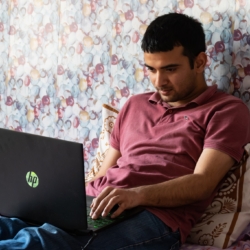To provide the best experiences, we use technologies like cookies to store and/or access device information. Consenting to these technologies will allow us to process data such as browsing behaviour or unique IDs on this site. Not consenting or withdrawing consent, may adversely affect certain features and functions.
The technical storage or access is strictly necessary for the legitimate purpose of enabling the use of a specific service explicitly requested by the subscriber or user, or for the sole purpose of carrying out the transmission of a communication over an electronic communications network.
The technical storage or access is necessary for the legitimate purpose of storing preferences that are not requested by the subscriber or user.
The technical storage or access that is used exclusively for statistical purposes.
The technical storage or access that is used exclusively for anonymous statistical purposes. Without a subpoena, voluntary compliance on the part of your Internet Service Provider, or additional records from a third party, information stored or retrieved for this purpose alone cannot usually be used to identify you.
The technical storage or access is required to create user profiles to send advertising, or to track the user on a website or across several websites for similar marketing purposes.
 There’s no question that many people now, feeling the weight of lockdown 3 and with no clear view on the timing of any sort of ‘return to normal’, are finding it tough to stay motivated. Many are burnt out. We can gain some insight into what is going on for many individuals by way of neuroscience, specifically how the brain works and how it copes with changing situations. (more…)
There’s no question that many people now, feeling the weight of lockdown 3 and with no clear view on the timing of any sort of ‘return to normal’, are finding it tough to stay motivated. Many are burnt out. We can gain some insight into what is going on for many individuals by way of neuroscience, specifically how the brain works and how it copes with changing situations. (more…)








 Workers in Britain are facing inequality due to a stark difference in employers’ approaches to flexible working, with nearly half (46 percent) of employees saying they do not have flexible working arrangements – such as flexi-time, part-time working, compressed hours or job shares – in their current role. This is according to new research from the
Workers in Britain are facing inequality due to a stark difference in employers’ approaches to flexible working, with nearly half (46 percent) of employees saying they do not have flexible working arrangements – such as flexi-time, part-time working, compressed hours or job shares – in their current role. This is according to new research from the 
 A new generation of long-term homeworkers created by COVID-19 is at risk physically and mentally through inadequate employer support, claims research by
A new generation of long-term homeworkers created by COVID-19 is at risk physically and mentally through inadequate employer support, claims research by 
 Recently lighting control firm Prolojik assembled an expert panel to talk about learning and working during the time of the Covid-19 pandemic. The roundtable (online of course) involved participants from various fields related to the built environment including those involved in developing, designing and tech reflected on their own experiences over the last several months. While industry issues raised during the session included what productivity really means and how to measure it, what infrastructure needs to be in place to enable people to return to their place of work or education and why a joined-up approach to wellness is an indisputably necessary strand of building management.
Recently lighting control firm Prolojik assembled an expert panel to talk about learning and working during the time of the Covid-19 pandemic. The roundtable (online of course) involved participants from various fields related to the built environment including those involved in developing, designing and tech reflected on their own experiences over the last several months. While industry issues raised during the session included what productivity really means and how to measure it, what infrastructure needs to be in place to enable people to return to their place of work or education and why a joined-up approach to wellness is an indisputably necessary strand of building management. 
 In April 2020, 47 percent of UK employees worked from home and for many, they still haven’t returned to the office. The events of 2020 have been unprecedented, as rules and advice from the government have changed at rapid rates in response to the Coronavirus Pandemic. But one thing that remained relatively consistent is the encouragement for those who can, to work from home.
In April 2020, 47 percent of UK employees worked from home and for many, they still haven’t returned to the office. The events of 2020 have been unprecedented, as rules and advice from the government have changed at rapid rates in response to the Coronavirus Pandemic. But one thing that remained relatively consistent is the encouragement for those who can, to work from home. 
 New research from
New research from 
 Companies are searching for ways to reinvent the office and give employees reasons to return to their workplace and a new report by
Companies are searching for ways to reinvent the office and give employees reasons to return to their workplace and a new report by 
 With primary and secondary schools closed to the majority of pupils as of 5 January 2021, many working parents have found themselves with an impossible task. How to juggle a full day of home schooling with a full day of work, all whilst in lockdown?
With primary and secondary schools closed to the majority of pupils as of 5 January 2021, many working parents have found themselves with an impossible task. How to juggle a full day of home schooling with a full day of work, all whilst in lockdown? 
 A new report by
A new report by 
 The past year will go down in history as one of dramatic change. One of the most notable upheavals was the almost overnight transition to full-time remote working for millions of ‘non-essential’ employees. With England now in its third national lockdown, many of us will likely not be going back to our offices until April 2021, over a year since we left them. Even when people are able to return to our old workplaces, just 12 percent of employees want to do so full-time, according to
The past year will go down in history as one of dramatic change. One of the most notable upheavals was the almost overnight transition to full-time remote working for millions of ‘non-essential’ employees. With England now in its third national lockdown, many of us will likely not be going back to our offices until April 2021, over a year since we left them. Even when people are able to return to our old workplaces, just 12 percent of employees want to do so full-time, according to 








February 2, 2021
Working from home spells trouble for the careers of younger workers
by Helen Jamieson • Comment, Flexible working